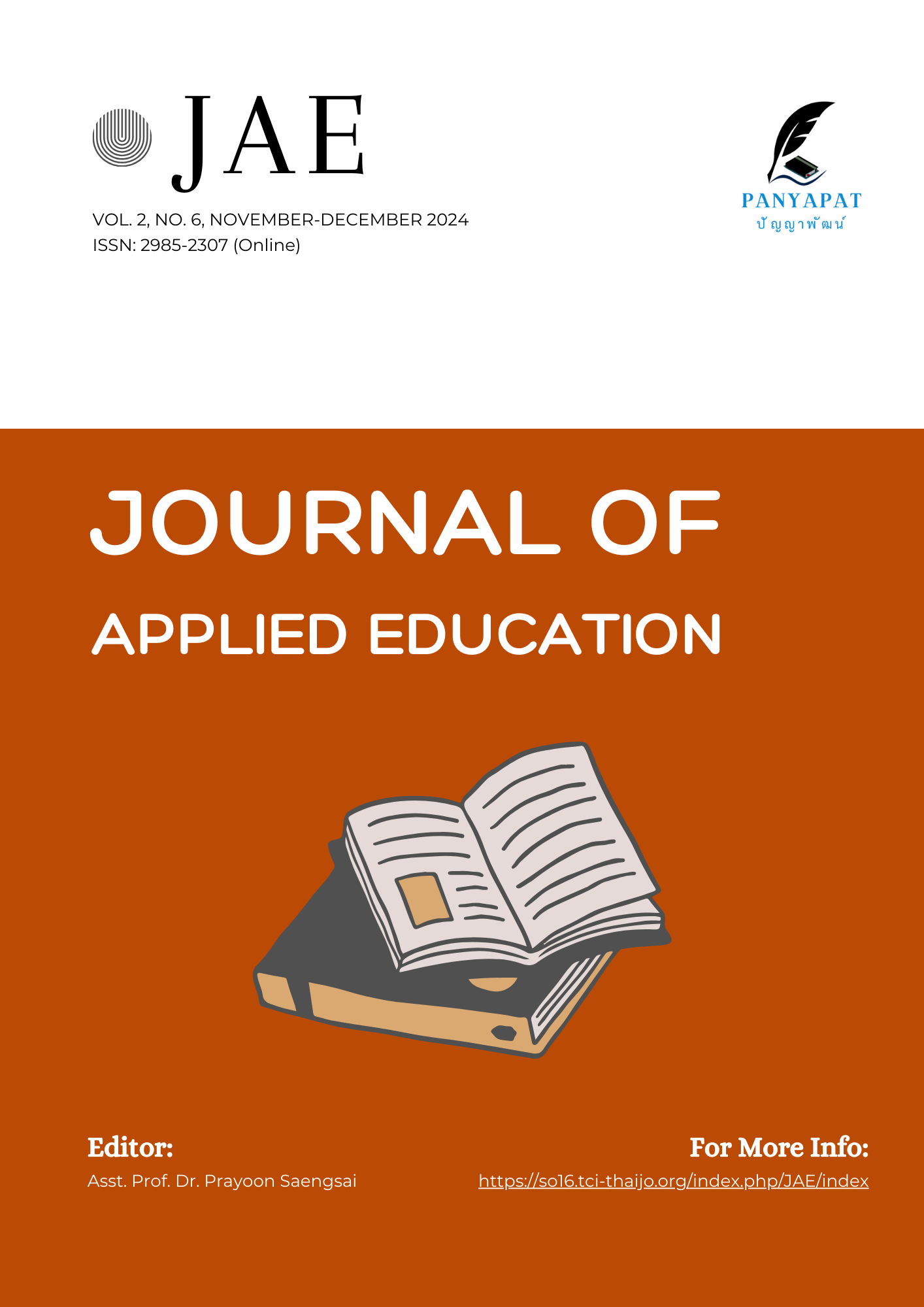Creative Leadership of Educational Administrators in the Digital Age
Main Article Content
Abstract
This article aims to present the creative leadership of educational administrators in the digital age. The results of the study found that: Creative leadership is an important trait that educational administrators in the digital age need to have, in order to lead their organizations to adapt and grow amid rapid changes in technology and society. Creative leaders must be able to think out of the box, see opportunities in crises, and create educational innovations that meet the needs of learners and society in the 21st century. Key characteristics of creative leadership in the digital age include: 1) Innovative vision: able to envision the future of education and plan strategies to lead the organization to that goal. 2) Flexibility and adaptability: ready to deal with change and adjust working methods to suit the situation. 3) Fostering an innovative culture: creating an atmosphere and organizational culture conducive to creative thinking and experimentation. Technology integration: able to apply digital technology to manage and develop teaching and learning effectively. 4) Networking and cooperation: coordinate and build cooperation with various sectors. To mobilize resources and knowledge to develop education 5) Human resource development: Promote and support teachers and educational personnel to develop digital skills and future skills. 6) Creative problem solving: Be able to analyze problems and find new and effective solutions. 7) Inspiration: Stimulate and inspire the team to dare to think, dare to act, and strive to always develop themselves. 8) Smart risk management: Dare to take reasonable risks to create new opportunities for the organization. Lifelong learning: Be a model in continuous learning and self-development in order to keep up with changes in the world.
Article Details

This work is licensed under a Creative Commons Attribution-NonCommercial-NoDerivatives 4.0 International License.
References
กรรณิกา เรดมอนด์ (2559). ตัวบ่งชี้ทักษะภาวะผู้นำในศตวรรษที่ 21 สำหรับผู้บริหารสถานศึกษาขั้นพื้นฐาน. (ศึกษาศาสตรดุษฎีบัณฑิต, มหาวิทยาลัยมหามกุฎราชวิทยาลัย).
จักรกฤษณ์ โพดาพล. (2555). ภาวะผู้นำเชิงสร้างสรรค์ของผู้บริหารเทศบาลตำบลในจังหวัดร้อยเอ็ด (รายงานการวิจัย). (ศึกษาศาสตรมหาบัณฑิต, มหาวิทยาลัยมหามกุฏราชวิทยาลัย).
ณัฎฐ์ ชาคำมูล, ฉันทนา จันทร์บรรจง, ภานุวัฒน์ ภักดีวงศ์ และ อนุชา กอนพ่วง. (2013). รูปแบบการพัฒนาภาวะผู้นำเชิงเปลี่ยนผ่านทางสังคมของผู้บริหารสถานศึกษา สังกัดสำนักงานคณะกรรมการการศึกษาขั้นพื้นฐาน. Journal of Education and Innovation, 15(2), 35–45.
ณัฏฐพันธ์ เขจรนันทน์. (2545). การจัดการทรัพยากรมนุษย์. กรุงเทพฯ: เม็ดทรายพริ้นติ้ง.
ธัญวิทย์ ศรีจันทร์. (2558). รูปแบบและกลยุทธ์การพัฒนาภาวะผู้นำในศตวรรษที่ 21 ของกรรมการองค์กรนิสิต. (ครุศาสตรดุษฎีบัณฑิต, จุฬาลงกรณ์มหาวิทยาลัย).
บุตรี จารุโรจน์. (2550). ภาวะผู้นำและการพัฒนาทีมงาน. กรุงเทพฯ: มหาวิทยาลัยธุรกิจบัณฑิตย์.
ประสาร ไตรรัตน์วรกุล. (2563). รัฐและระบบราชการไทยกับความท้าทายข้างหน้าของประเทศ. สืบค้น 1 กุมภาพันธ์ 2567. จาก http://tdri.or.th/wp-content/uploads/2020/10/ดร_ประสาร_รัฐ และระบบราชการไทยกับความท้าทายข้างหน้าของประเทศ.pdf.
มติชนออนไลน์. (2563). ครูในยุค Disruption. สืบค้น 1 กุมภาพันธ์ 2567. จาก https://www.matichon.co.th/columnists/news_1878563.
มหาวิทยาลัยเกษตรศาสตร์. (2564). ผู้บริหารยุคใหม่ต้องรู้จัก Disruptive Innovation และรับมือกับ Volatility ให้เป็น. สืบค้น 1 กุมภาพันธ์ 2567. จาก https://amec-ku.org/14039/.
มหาวิทยาลัยธรรมศาสตร์. (2563). ใครบ้างที่จะอยู่รอด? ในยุค DISRUPTION 2020 ตลาดแรงงานและการศึกษา. สืบค้น 1 กุมภาพันธ์ 2567. จาก https://tu.ac.th/thammasat-tbs-talk-technology-disruption-2020.
มัทนา วังถนอมศักดิ์. (2560). ภาวะผู้นำทางการศึกษา ทฤษฎีและการปฏิบัติ. นครปฐม: เพชรเกษมพริ้นติ้ง กรุ๊ป.
รังสรรค์ ประเสริฐศรี. (2544). ภาวะผู้นำ (Leadership). กรุงเทพฯ: ธนธัชการพิมพ์.
วันชัย ราชวงศ์. (2562). ภาวะผู้นำสถานศึกษายุคดิจิทัล. วารสารสมาคมพัฒนาวิชาชีพการบริหารการศึกษาแห่งประเทศไทย, 1(4), 25-31.
สำนักงานส่งเสริมการศึกษานอกระบบและการศึกษาตามอัธยาศัย. (2562). คู่มือการประเมินคุณภาพการศึกษาโดยต้นสังกัดตามมาตรฐานการศึกษานอกระบบและการศึกษาตามอัธยาศัย พ.ศ. 2562. กรุงเทพฯ: สำนักงานส่งเสริมการศึกษานอกระบบและการศึกษาตามอัธยาศัย สำนักงานปลัดกระทรวงศึกษาธิการ.
สุวิมล ว่องวาณิช. (2562). การวิจัยประเมินความต้องการจำเป็น. กรุงเทพฯ: จุฬาลงกรณ์มหาวิทยาลัย.
เสถียร พะโยธร. (2560). การพัฒนาโปรแกรมเสริมสร้างภาวะผู้นาทีมที่มีประสิทธิผลสำหรับผู้บริหารระดับต้น โรงเรียนมัธยมศึกษา. (การศึกษามหาบัณฑิต, มหาวิทยาลัยมหาสารคาม).
อรวรรนี ไชยปัญหา. (2556). รูปแบบการพัฒนาภาวะผู้นำทีมของผู้บริหารโรงเรียนขนาดเล็ก. (ปรัชญาดุษฎีบัณฑิต, มหาวิทยาลัยราชภัฏสกลนคร).
Kaganer, E., Zamora, J., & Sieber, S. (2013). 5 Skills Every Leader Needs to Succeed in the Digital World: The Digital Mind-set. Washington, DC: International Society for Technology in Education (ISTE).
Northouse, P. G. (2004). Leadership: Theory and Practice. California: Sage Publications.
Rebore, R. W. (2001). Human resources administration in education a management approach. (6th ed.). Boston: Allyn and Bacon.

